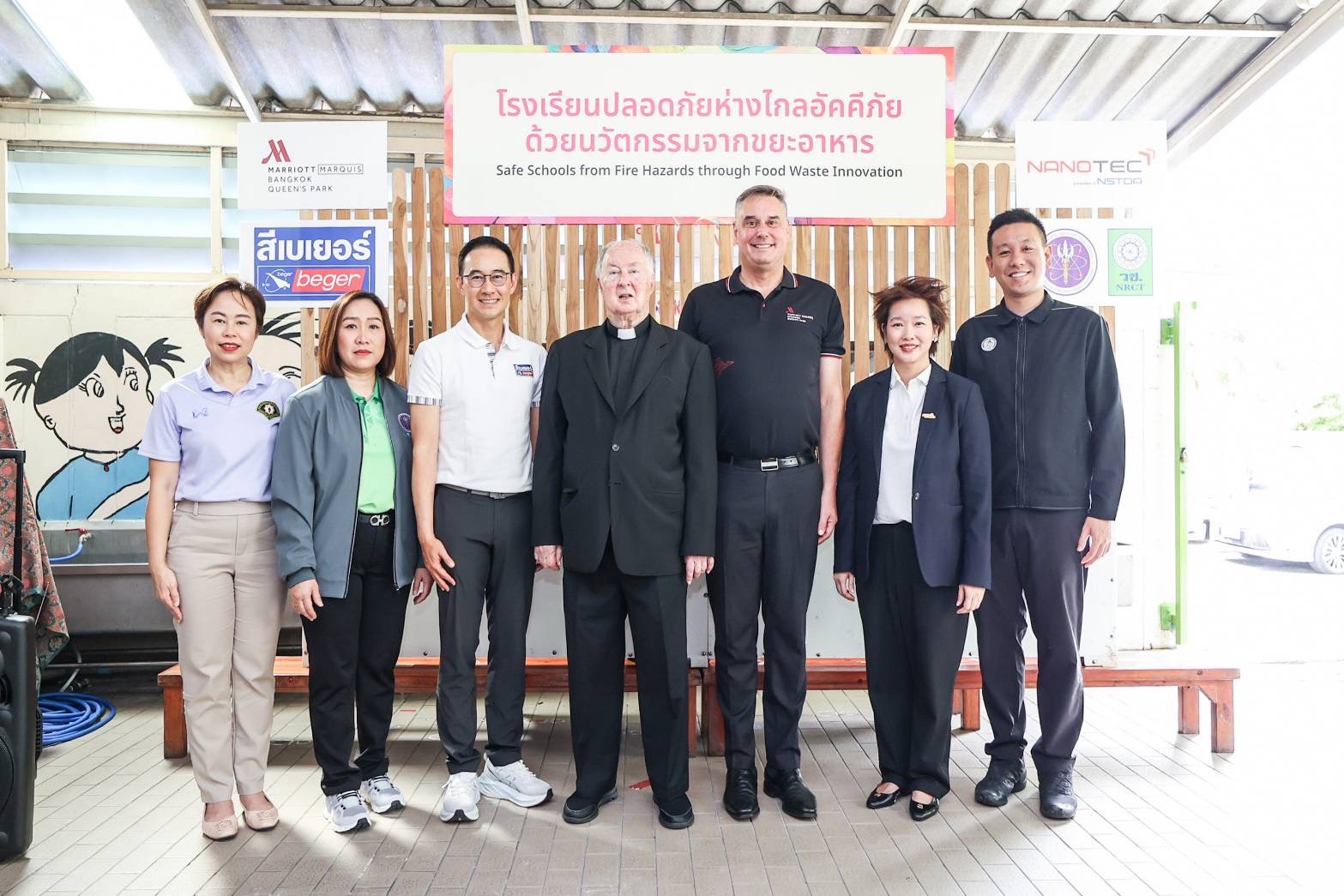Bangkok, July 4, 2025 – The National Science and Technology Development Agency (NSTDA), through its National Nanotechnology Center (NANOTEC), has partnered with Bangkok Marriott Marquis Queen’s Park Hotel, Beger Co., Ltd., and the Bangkok Metropolitan Administration to launch the initiative “Safe Schools: Preventing Fire Hazards with Innovation from Food Waste.”
The project aims to promote fire safety in early childhood education centers by using eco-friendly flame-retardant paint derived from processed shell waste. The pilot site is HDF Mercy Centre in Khlong Toei District, where indoor walls are being coated with this innovative fire-resistant paint, with plans to expand to other community childcare centers across Bangkok.
Shell Waste Turned into Life-Saving Innovation
Dr. Uracha Ruktanonchai, Executive Director of NANOTEC, explained that NSTDA plays a central role in leveraging science, technology, and innovation (STI) to support Thailand’s research ecosystem and solve pressing national challenges. NANOTEC, in particular, is committed to advancing nanotechnology for industrial and sustainable societal development.
“This collaboration demonstrates how scientific research can create added value from organic waste—specifically shell waste—by integrating the strengths of public and private sectors to develop innovations that benefit communities, the environment, and the country in a sustainable way,” Dr. Uracha said.
The flame-retardant material, developed by Dr. Chutipan Lertwachirapaiboon and the Responsive Nanomaterials Research Team at NANOTEC, is a nanocomposite made from nano-calcium hydrogen phosphate and calcium carbonate, derived from discarded mussel and oyster shells. Funded by the National Research Council of Thailand (NRCT), the project has successfully transformed agricultural shell waste into high-value advanced materials.
The resulting flame-retardant additives can be produced in powder or liquid form. Applications include water-dispersible sprays for fire-proofing surfaces or as additives in polymers—such as 3D printing filaments—for manufacturing flame-resistant components.
Turning Hotel Food Waste into Safety Solutions
The “Safe Schools” project utilizes the massive volume of oyster shells discarded monthly—around one ton—from Goji Kitchen + Bar at Bangkok Marriott Marquis Queen’s Park. The shells were used in collaborative R&D with NANOTEC to develop the flame-retardant compound, which meets UL94 V-0 standards for fire safety—self-extinguishing within 10 seconds with no dripping flames.
Beger Co., Ltd. then built upon this innovation to create a flame-retardant indoor paint tailored for use in vulnerable community spaces, especially those serving young children and the elderly.
Simon Bell, General Manager of Bangkok Marriott Marquis Queen’s Park, said the project showcases the power of cross-sector collaboration between the hospitality industry, academia, business, and local communities.
“This initiative is a prime example of how low-value organic waste can be transformed into high-impact innovations. By properly sorting and managing food waste at the source, valuable materials can be redirected into the R&D pipeline at NANOTEC, converted into functional resources, and developed into real-world products through private-sector partnerships like Beger,” said Bell.
A New Standard for Sustainable Paint
Dr. Worawat Chaiyosburan, CEO of Beger Group, emphasized that the company’s mission goes beyond aesthetics and durability.
“At Beger, we develop products with a spirit of innovation that supports health and safety for building occupants. That’s why we selected BegerCool All-Plus Interior—a paint that reduces indoor heat and offers built-in flame retardance. Through this collaboration, we enhanced the formulation with additives derived from food waste in partnership with Marriott and NANOTEC researchers,” said Dr. Worawat.
“This project reflects Beger’s core belief that ‘good paint’ should not only look good but also optimize resource use, provide long-term societal benefits, and contribute to community well-being.”














